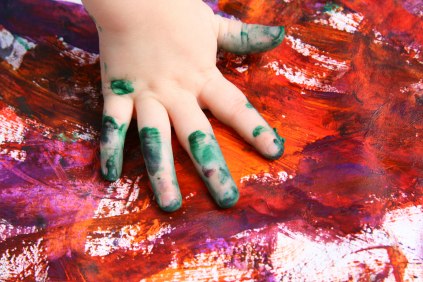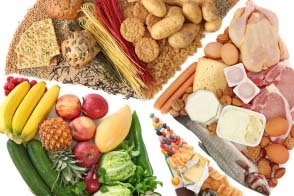When your child eats, food passes through the mouth and it meets the germs or bacteria that live in the mouth. These bacteria have sugars and starches found in many foods. If you do not clean your child’s teeth after eating, plaque bacteria use the sugars and starches to produce acid that destroys the hard surface of the tooth. After a while tooth begins to decay.
Tooth decay is a common problem among children, worldwide. The mouth is the pathway to the body and it is also his vehicle of communication. If he has bad teeth, it can effect his social life. Children with unsightly teeth avoid smiling or speaking and gradually become introverted. So it is very important to be careful about your child’s dental health.
One of the serious dental problems that occurs in childhood and is completely preventable is caries. Make sure that your child gets enough fluoride, eats right and is regularly checked by a dentist.

Insure Your Child’s Smile [Illustration by Shiju George]
Fluoride is a natural chemical that can be added to drinking water. It is important because: –
- It strengthens the enamel, the hard outer coating of the teeth.
- It prevents tooth decay.
- It helps repair early damage to the teeth.
- Sufficient fluoride ingestion promotes optimal tooth development.The fluoride content in the municipal water supply varies from place to place. Water with low levels of fluoride can be a problem for infants. But, remember to consult your paediatrician before you start with any remedy.
Eating Right
Diet and nutrition play an important role in delaying tooth decay. The child’s diet during tooth formation can contribute to the resistance or susceptibility of teeth to acid destruction. Children with a teeth-unfriendly diet are more susceptible to dental problems. For good dental health, keep the following tips in mind:
- Give a balanced diet to your child. Choose foods from all the five major food groups — cereals, fruits, vegetables, meat and meat products, and milk and milk products.
- Limit the number of snacks your child eats. Each time he eats food, acids attack teeth for 20 minutes or more. For snacks, use nutritious foods, such as cheese, raw vegetables or yoghurt. Ideally, set regular snack times to avoid constant exposure to cavity causing foods.
- Sweets like candy or cookies can lead to tooth decay as they tend to stick to the teeth for a long time and are therefore harmful. Plaque thrives on sugar, turning it into acids that eat away at the enamel. Avoid these as much as possible.
- Sugar from fruits and fruit juices are equally harmful if they are allowed to stay in the mouth for long. Starches and fruits, however, are a necessary part of a child’s diet, so, to avoid tooth decay, give them to your child only at meal time. During a meal, more saliva is released which helps in washing food from the mouth, thus reducing the effect of acid.
- Inculcate the habit of washing the mouth after every meal or snack. The natural fluoride in water will help your child’s teeth.
- Calcium is a must for your child’s teeth and bones. He gets his recommended daily dose from foods like milk, orange juice and leafy greens (spinach, broccoli, mustard greens, yogurt, cheese, cottage cheese). Make sure his calcium requirement is met at all costs.
- Teach him to brush twice a day with fluoride toothpaste. Make him use dental floss to clean in between the teeth.Preventive DentistryYour child should get regular dental checkups after all his 20 baby teeth have appeared. The sooner you visit a dentist the better the chance of preventing dental diseases. Visit a dentist every six months or at least annually. Some children, however, need more frequent visits because of increased risk of tooth decay or malformed teeth.Children with a healthy mouth chew more easily and gain more nutrients from food. They have a better chance of general health, because disease in the mouth can endanger the rest of the body. It also gives them confidence in their appearance. Taking care of this aspect of your child’s development is your responsibility and one that requires only some commitment and basic knowledge.
Common Questions
What should I do if my child’s tooth is knocked out?
Place the tooth in cool milk or if the child is old enough, under the child’s tongue and get to the dentist within 30 minutes so that it can be re-implanted.
Does thumb sucking hurt teeth?
Thumb sucking is normal in infants and young children. It does not cause a permanent problem if it stops by five years of age. Children who suck their thumb past the age of five years may need to see a paediatric dentist to determine problems with tooth positioning after they cut permanent teeth.
What can I expect when my child starts teething?
When teething begins, your child’s gum swells up. An infant may produce more saliva than he is able to swallow, which makes him drool. He also puts objects into his mouth to chew on them. He may also have loose stools.
When should I start cleaning my child’s teeth?
Daily dental cleaning should start as soon as your child cuts his first tooth. Wipe the tooth clean with a piece of gauze or a damp cloth. Switch to fluoride toothpaste and a toothbrush, as the child grows older. As children tend to swallow toothpaste and ingesting too much of fluoride might result in mottling (bright white stains on the tooth), put only a small amount on the toothpaste.
Can putting a child in bed with a bottle harm his teeth?
Do not put your child to bed with a bottle. Infants put to bed with a bottle filled with milk or juice have a higher risk of developing ‘baby bottle tooth decay’ or ‘nursing bottle decay.’ When your child falls asleep, he will still have a small amount of liquid in his mouth. The sugar in milk or juice will create a breeding ground for bacteriae, which will damage his teeth. Teach your child to drink from a cup as soon as he is old enough to hold one.
When should a dentist be contacted?
- If the child chips or injures a tooth or has an injury to the face or mouth.
- If his teeth show any signs of discolouration. This could be a sign of tooth decay.
- If a tooth is painful or is sensitive to hot or cold foods or liquids. This could also be a sign of decay.
Did you know?
- Chewing gum could actually help in keeping teeth clean? Choose a sugar-free brand and chew it for up to 20 minutes after eating. Chewing gum makes your mouth produce more saliva that helps protect against decay.
- An apple if eaten after each meal cleans your teeth? The acid content in apple removes food particles, foul breath, germs, prevents bleeding from gums, apart from keeping teeth and gums healthy.










